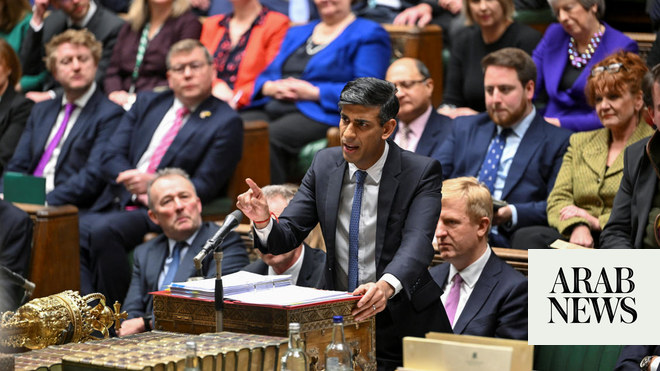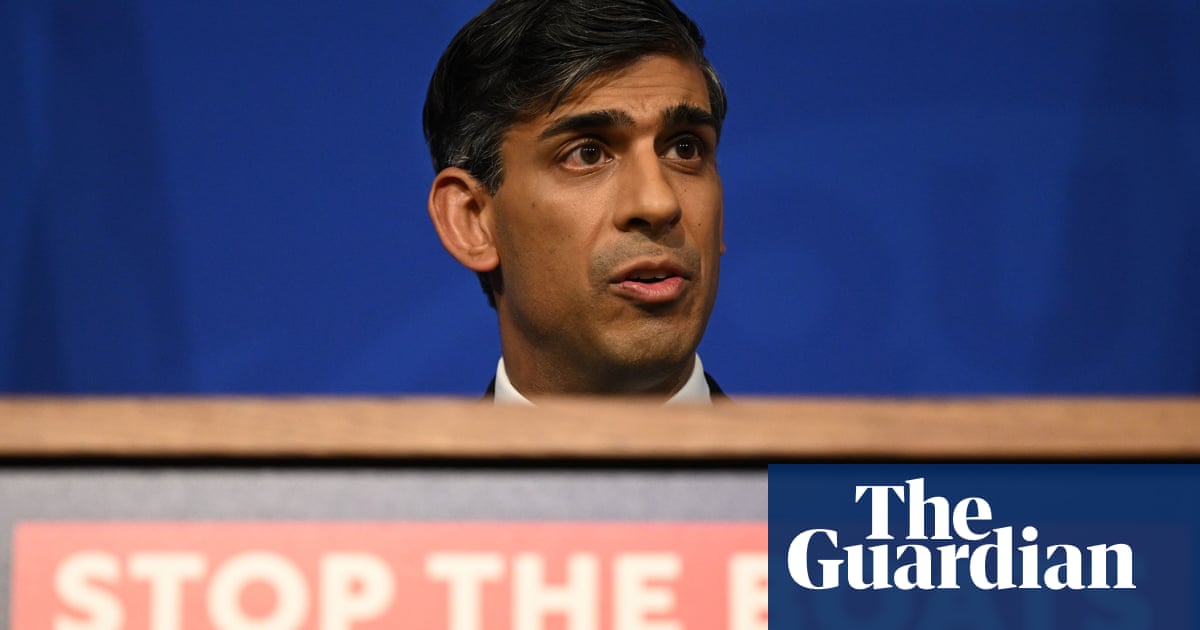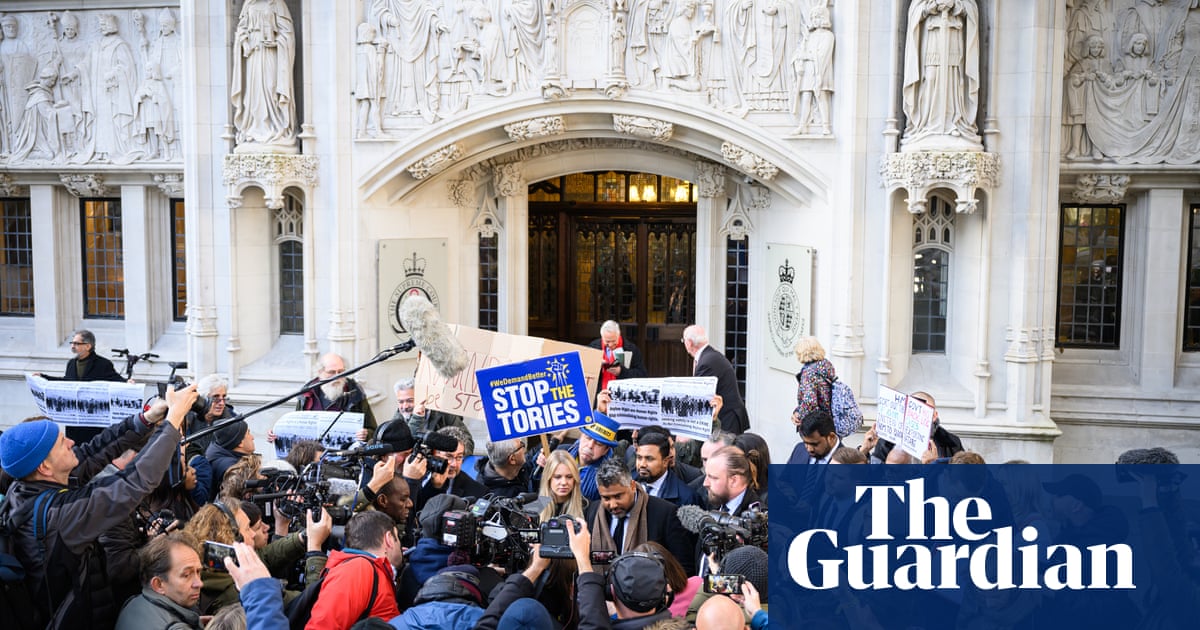
Boris Johnson’s plan to send an inaugural flight of asylum seekers to Rwanda has been abandoned after a dramatic 11th-hour ruling by the European court of human rights.
Up to seven people who had come to the UK seeking refuge had been expected to be removed to the east African country an hour and a half before the flight was due to take off.
But a ruling by the ECHR on one of the seven cases allowed lawyers for the other six to make successful last-minute applications.
The decision is a significant and embarrassing blow for Boris Johnson and his home secretary, Priti Patel, who had promised to start sending thousands of asylum seekers 4,000 miles to the east African country in May.
It comes hours after the prime minister threatened to take the UK out of the ECHR and accused lawyers of aiding criminals exploiting refugees in the Channel.
The legality of the Rwanda policy will be tested in a full court hearing next month.
Responding to the decision, Patel said she was “disappointed” by the legal challenge, made pointed criticisms of the ECHR ruling and said that the policy will continue.
“We will not be deterred from doing the right thing and delivering our plans to control our nation’s borders,” she said. “Our legal team are reviewing every decision made on this flight and preparation for the next flight begins now.”
Yvette Cooper, the shadow home secretary, said that the government must take responsibility for the failed flight, and indicated that the government does not mind clashing with lawyers and the European courts.
“Ministers are pursuing a policy they know isn’t workable and that won’t tackle criminal gangs,” she wrote on Twitter last night. “But they still paid Rwanda £120m and hired a jet that hasn’t taken off because they just want a row and someone else to blame.”
The flight, which cost an estimated £500,000, had already been paid for from the public purse, a government source confirmed. The UK government has paid £120m as a downpayment on the Rwanda deal. The government has declined to say how much it has paid in legal costs, and has not said how much it expects to pay for future flights, accommodation and living costs for everyone sent to Rwanda.
The ECHR examined the case of a 54-year-old Iraqi asylum seeker who crossed the Channel in a boat.
He claimed asylum in the UK last month citing danger to his life in Iraq. Five days later, he was served with a notice of intent indicating that the Home Office was considering deeming his asylum claim inadmissible and relocating him to Rwanda.
A doctor at the detention centre issued a report saying that he may have been a victim of torture, it is understood. He was then served with removal directions to Rwanda for 14 June 2022. A letter from the court said that the asylum seeker should not be removed on Tuesday evening.
The ECHR said it took particular account of evidence that asylum seekers transferred from the UK to Rwanda will not have access to fair and efficient procedures for the determination.
The decision also cited the ruling by Mr Justice Swift, who on Friday dismissed a request for an urgent injunction temporarily halting the flight.
A statement from the ECHR said an urgent interim measure was granted in the case of KN, “an asylum seeker facing imminent removal to Rwanda”, v the UK.
“The European Court has indicated to the UK government that the applicant should not be removed to Rwanda until three weeks after the delivery of the final domestic decision in his ongoing judicial review proceedings,” it said.
Earlier, the prime minister hinted again that the UK could leave the European convention on human rights to make it easier to remove illegal migrants from the UK.
Asked whether it was time for the UK to withdraw from the ECHR after the government’s difficulty in implementing its Rwanda policy, the prime minister said: “Will it be necessary to change some laws to help us as we go along? It may very well be.”
In April, at the launch of the Rwanda policy, Johnson had said that thousands of asylum seekers would be sent away, and that the first flight would leave in May.
The scheme has been beset with “teething problems”, Johnson has admitted. The number of asylum seekers expected to be sent to Rwanda fell from 130 at the start of last week, to 31 on Friday, to just seven on Tuesday.
Most successfully lodged appeals claiming that sending those seeking sanctuary in the UK to an east African state with a poor human rights record breaches their human rights or that they have been victims of modern slavery.
At a Cabinet meeting on Tuesday, Johnson also implied that lawyers representing asylum seekers are aiding human traffickers who charge thousands for journeys in dangerous boats across the Channel.
“They are, I’m afraid, undermining everything that we’re trying to do to support safe and legal routes for people to come to the UK and to oppose the illegal and dangerous routes,” he said.
He said what the “criminal gangs are doing and what … those who effectively are abetting the work of the criminal gangs are doing, is undermining people’s confidence in the safe and legal system, undermining people’s general acceptance of immigration”.
Campaigners for refugee rights welcomed the decision and warned that the policy is still being pursued.
Enver Solomon, CEO of Refugee Council, said the government should have a grown-up conversation with France and the EU about dealing with refugees, particularly in the Channel.
“Those threatened with removal are people who have escaped war, persecution, torture, and violence – many of whom have only been prevented from flying due to individual legal interventions declaring it a clear breach of their human rights to do so. The Refugee Council has also had to directly intervene to stop young people being removed to Rwanda because they were falsely assessed as adults.
“Government claims that this deal would act as a deterrent to end the model of people-traffickers, have already been disproven with the numbers of people travelling across the channel almost doubling on the same time last year. We always knew these measures would do little to stop desperate people making dangerous journeys to the UK, because they do absolutely nothing to address the reasons people come.”
Mark Serwotka, general secretary of the Public and Commercial Services union, said: “We’re pleased the courts have ruled to stop this flight. It’s time for the government to stop this inhumane policy which is the basest of gesture politics and start to engage seriously with sorting out the asylum system so those who come to our country seeking refuge are treated fairly and according to the law.”
A Rwandan government spokesperson, Yolande Makolo, told a press conference in Kigali earlier on Tuesday that there were “misconceptions” about what Rwanda is like and “some of this is perpetuated by the media”.
“When the first flights land here in Kigali the new arrivals will be welcomed and looked after and supported to make new lives here. We will provide support with their asylum applications, including legal support, translation services and we will provide decent accommodation.”
Downing Street justified the estimated £500,000 expense of the flight, saying that immigration costs the UK taxpayer £1.5bn every year already, with almost £5m a day on accommodating asylum seekers in hotels.
On Monday, 138 people reached the UK in three boats, while more than 200 arrived on Tuesday, with more than 10,000 migrants recorded as making the journey so far this year.












